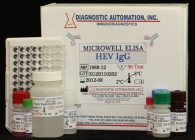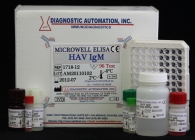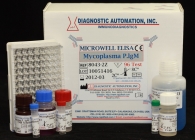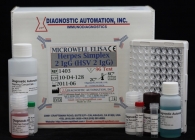
ELISA Kits
- • Anemia ELISA kits
- • Allergy ELISA kits
- • Autoimmune Disease kits
- • Bone Metabolism ELISA kits
- • Blood bank ELISA kits
- • Cancer ELISA kits
- • Cardiac Markers ELISA kits
- • Diabetes Assays ELISA kits
- • Drug test ELISA kits
- • Fertility ELISA kits
- • Food ELISA kits
- • Infectious Disease ELISA kits
- • Other ELISA Kits
- • Parasitology ELISA kits
- • Steroid ELISA kits
- • Thyroid ELISA kits
Rapid Tests
- • Allergy Rapid tests
- • Bone Metabolism
- • Cancer Rapid tests
- • Cardiac markers Rapid tests
- • Drug Tests
- • Fertility Rapid tests
- • Hepatitis Panel
- • Infectious Disease & other tests
- • Other
- • Ovulation Rapid tests
- • Pregnancy tests
- • Urine Reagent Strips tests
IFA Kits
Chemiluminescence Immuno Assays
- • Allergy Assays
- • Autoimmune Thyroid Assays
- • Cardio-Vascular Monitoring
- • Diabetes Assays
- • Fertility Assays
- • Growth Deficiency
- • Infectious Disease Assays
- • Others
- • Steroid Assays
- • Thyroid Assays
- • Tumor Marker Assays
Serology Tests
- • ASO (Anti-Streptolysin-O)
- • CRP (C-Reactive Protein)
- • Mono (Infectious Mononucleosis)
- • RF (Rheumatoid Factor)
- • RPR (Rapid Plasma Reagin)
- • SLE (Systemic Lupus Erythematosus)
Instrumentation



HEV IgG ELISA kit
| Name |
HEV IgG ELISA Test |
|---|---|
| Full name |
Human HEV IgG ELISA Test Kit, Export Use Only |
| Category Name | Infectious Disease ELISA kits |
| Test | 96 |
| Method | ELISA method: Enzyme Linked Immunosorbent Assay |
| Principle | Indirect ELISA: Antigen Coated Plate |
| Detection Range | Qualitative Positive; Negative control & Cut off |
| Sample | 10ul Serum |
| Specificity | 85.4% |
| Sensitivity | 93.8% |
| Total Time | ~ 75 min |
| Shelf Life | 12-18 Months from the manufacturing date |
 |
 |
 |
HEV IgG ELISA kit description:
"Export Use Only"
HEV ELISA kit is an enzyme-linked immunosorbent assay for the qualitative detection of IgG-class antibodies to hepatitis E virus in human serum or plasma. It is intended to be used as an aid in supplementary diagnosis to acute hepatitis E infection and prevalence studies among the population.
Materials Provided with HEV ELISA kit:
1. Microwell strips: recombinant HEV antigen coated wells
2. Negative Control: non-reactive for anti-HEV
3. Positive Control: anti-HEV IgG antibodies diluted
4. HRP-Conjugated : rabbit anti-human IgG antibodies
5. Specimen Diluent: Protein buffer solution
6. Stock Wash Buffer: 20 x
7. Chromogen Solution A: Urea peroxide solution
8. Chromogen Solution B: TBM
9. Stop Solution
10. Plastic sealable Bag
11. Cardboard Plate Cover
12. Package Insert
Materials & Instrumentations Required, not provided:
1. Freshly distilled or deionized water
2. Dispensing system and/or pipette & tips
3. Microshaker for dissolving and mixing conjugate with samples
4. EIA kit Microplate Washer
5. EIA kit Microplate Reader at 450nm wavelength
HEV ELISA Test Background Information:
Hepatitis E is a recurring infection in developing countries. In less frequent, isolated cases, it has also been reported in developed countries. Identified in 1990, Hepatitis E (HEV) is a non-enveloped, single stranded RNA virus where infection can lead to acute (or subclinical) liver disease, like that associated to hepatitis A infection. Fatality rates are generally low - averaging 0.5-3 percent for most patients, while pregnant women hold elevated averages around 15-25 percent. In 1995 a theory was introduced that HEV was transmitted to humans from animals (zoonosis). Not long after that, in 1997 and 2001, respectively, HEV was identified as transmitted from swine and from birds. After that time, HEV infection transmission has been associated with several animals, for example, wild monkeys, deer, cow, goats, rodents, dogs, and chickens. Found in both developing and developed countries, these HEV infections (including anti-HEV) consisted of viremia and feces excretion of HEV-affected animals, such as those listed above. A direct link to acute hepatitis E in humans from eating uncooked deer meat, was also reported. Also found in supermarkets in Japan, HEV genome sequences have been identified in pork livers.
HEV ELISA Test Principle:
HEV ELISA kit employs solid phase, indirect ELISA method for detection of IgG-class antibodies to HEV (anti-HEV) in two-step incubation procedure. Polystyrene microwell strips are pre-coated with recombinant, highly immunoreactive antigens corresponding to the structural regions of HEV (ORF-2). During the first incubation step, anti-HEV specific antibodies, if present, will be bound to the solid phase pre-coated HEV antigens. The wells are washed to remove unbound serum proteins and then, rabbit anti-human IgG antibodies (anti-IgG) conjugated to horseradish peroxidase (HRP-Conjugate) are added. During the second incubation step, these HRP-conjugated antibodies will be bound to any antigen-antibody (IgG) complexes previously formed and the unbound HRP-conjugate is then removed by washing. For additional details please refer to the instructions for use.
Notable features of Infectious Disease ELISA Kits:
User-friendly directions and explanation of test procedures
Simple and safe reagent preparation
Clear instructions on specimen collection
Comprehensive package of required materials
Explicit quality control and storage guidelines
Reliable and easy-to-read test results
Most Infectious Disease ELISA kits follow a similar method. See the HEV ELISA Kit product insert for details on preparation, procedures, quality control, and test result interpretation.
Diagnostic Automation Inc provides other Infectious Disease ELISA Kits. For more information about ELISA Kits, Rapid Tests, IFA Kits, CLIA Test Kits, or Serology tests, please see our website home page, or contact our Customer Service Representative at 818-591-3030.
* Not to be sold, shipped or distributed in The United States.
Product Note:
Specimen to be tested by HEV IgG ELISA kit test should be kept at 2-8 C. Samples not required for assaying within 3 days should be stored frozen (-20 C or lower).
ELISA kits - Rapid tests- Drug tests- Pregnancy test - IFA kits - CLIA assays - Serology tests - Instrumentation
©1992 Diagnostic Automation/Cortez Diagnostics Inc. All rights reserved.


 HSV-2 IgA ELISA kit
HSV-2 IgA ELISA kit
 HAV IgM ELISA kit
HAV IgM ELISA kit
 Mycoplasma pneumoniae IgM ELISA kit
Mycoplasma pneumoniae IgM ELISA kit
 Measles IgG ELISA kit
Measles IgG ELISA kit
 HSV-2 IgG ELISA kit
HSV-2 IgG ELISA kit








